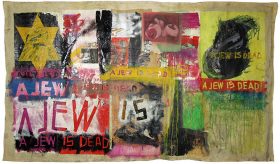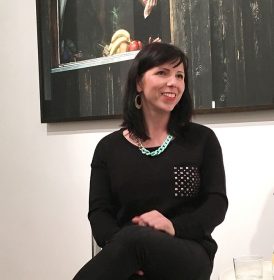Three Questions to Marion Kraft
On 6 July 2016, we are proud to present “Children of the Liberation,” the new anthology in the “New German Stories” series. We will welcome the editor Marion Kraft and the authors Ika Hügel-Marshall and Judy Gummich as our guests. They will speak about the experiences and perspectives of Black Germans of the post-war generation and thus illuminate a little-known part of German history and American-German relations. The volume unites the biographies and voices of a variety of authors and considers questions of racism in the past and present as well as the diverse reality of Black people in Germany today.
We asked Marion Kraft three questions in advance:
Serpil Polat: Dear Ms Kraft, how did the idea for this project come about and what was your personal motivation in realizing it?
Marion Kraft: The idea for the book came about in fall 2014 in the course of talking to some of the authors, who, like myself, were born in post-war Germany to white German women and African-American soldiers. What struck us in particular was that on the one hand the part played by these soldiers in the liberation of Germany from Nazism has been largely neglected in the recording of history and on the other hand, the experiences of racism Black people had to make in postwar Germany were in danger of being forgotten. We also found that current socio-historical research projects on the postwar era often paint a very one-sided picture of the so-called “colored children of occupation.” Thus we felt it important to make our voice heard to mark the 70th anniversary of the end of the war in 2015.
What is the origin of the title Children of the Liberation and who is meant?
The title Children of the Liberation refers to the liberation of Germany from fascism, which the African-German-American journalist and witness of the time Hans-Jürgen Massaquoi referred to as the much-deserved demise of one of the most brutal systems of rule. “Liberation” stands in contrast to the term “occupation,” which is still used sometimes, and at the same time refers to liberation from the discriminating labels that prevailed for a long time to describe the children of Allied soldiers and German women, in particular the Black children. The book title also describes the experiences of the people who, against all odds, took the positive crafting of their lives into their own hands.
The book combines various facets – historical and academic analyses, biographical narratives, interviews, and literary texts. What is the concept behind this variety of approaches and texts?
The concept behind this is to illuminate this part of suppressed history from different perspectives. My introduction sorts the experiences of the post-war generation into the long history and current situation of Black people in Germany. The biographical narratives and interviews that follow propose alternatives to a recording of history determined by the power structures, and are bound by various scientific analyses into a collective experience. We also included some lyrical texts because they can provide a special means of reflection. Thus the volume is aimed at a diverse readership and provides various stimuli to analyze the history of and fight the still persistent forms of racism.
The questions were posed by Serpil Polat, academy programs on migration and diversity, who does her own research on biographies and racism and is very much looking forward to the evening.
Those interested in hearing more and asking further questions are welcome to attend the discussion and reading Children of the Liberation. The Perspectives of Black Germans of the Postwar Generation on 6 July 2016 at 7 pm in the hall at the W. Michael Blumenthal Academy of the Jewish Museum Berlin. Bookings on tel. +49 (0)30 25993 488 or reservierung@jmberlin.de. Further information in our calender of events.




